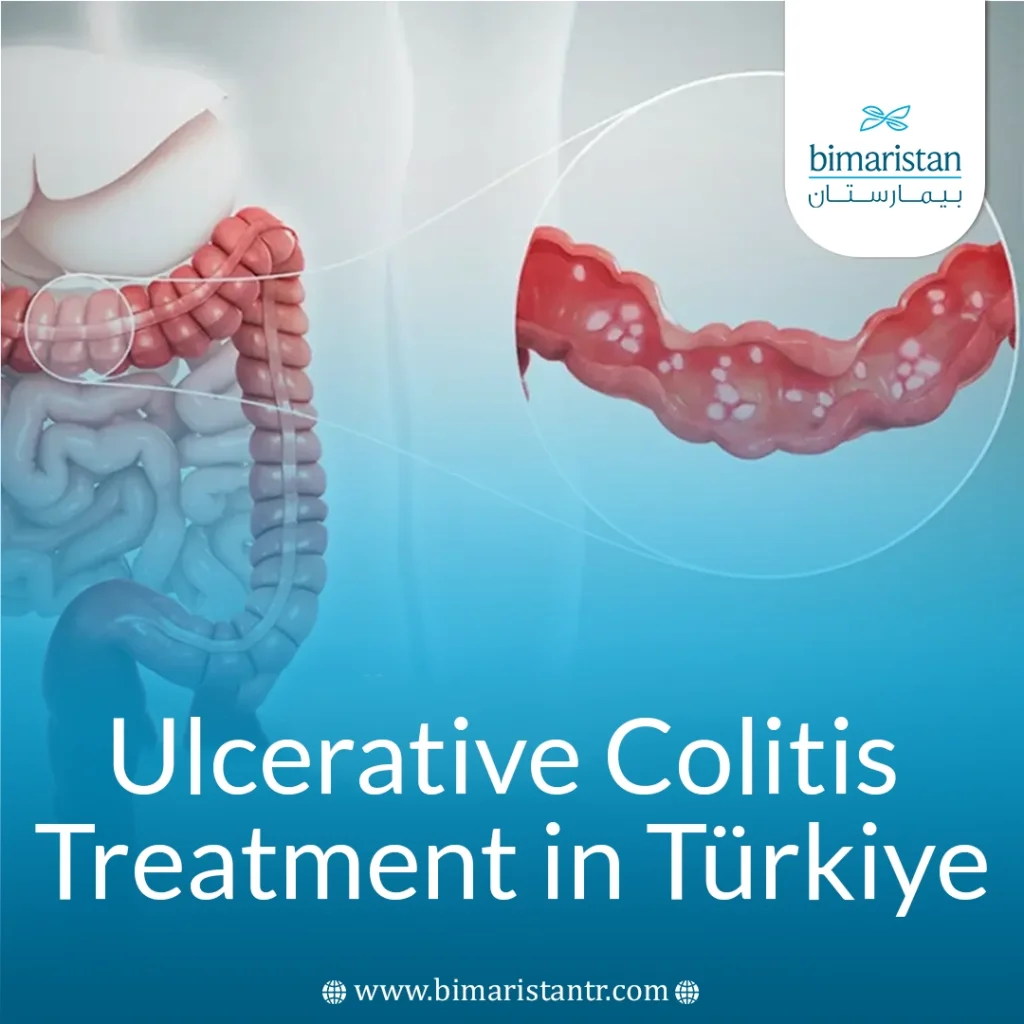Ulcerative colitis treatment has progressed significantly in recent years, offering diverse options to relieve symptoms and improve patients’ quality of life. Ulcerative colitis is a chronic condition of the large intestine that can severely impact daily living. The disease is common worldwide, and in Turkey, medical care is advancing rapidly with the adoption of cutting-edge technologies and specialized treatment expertise.
About the Colon
The colon is the largest part of the large intestine, consisting of the cecum, colon, and rectum. The colon extends from the end of the cecum to the beginning of the rectum and is about 150 centimeters long. The primary function of the colon is to absorb water and salts from undigested foods and convert what remains into waste (feces) to be expelled from the body through the anus. The colon is anatomically divided into four sections: the ascending colon, descending colon, transverse colon, and sigmoid colon.
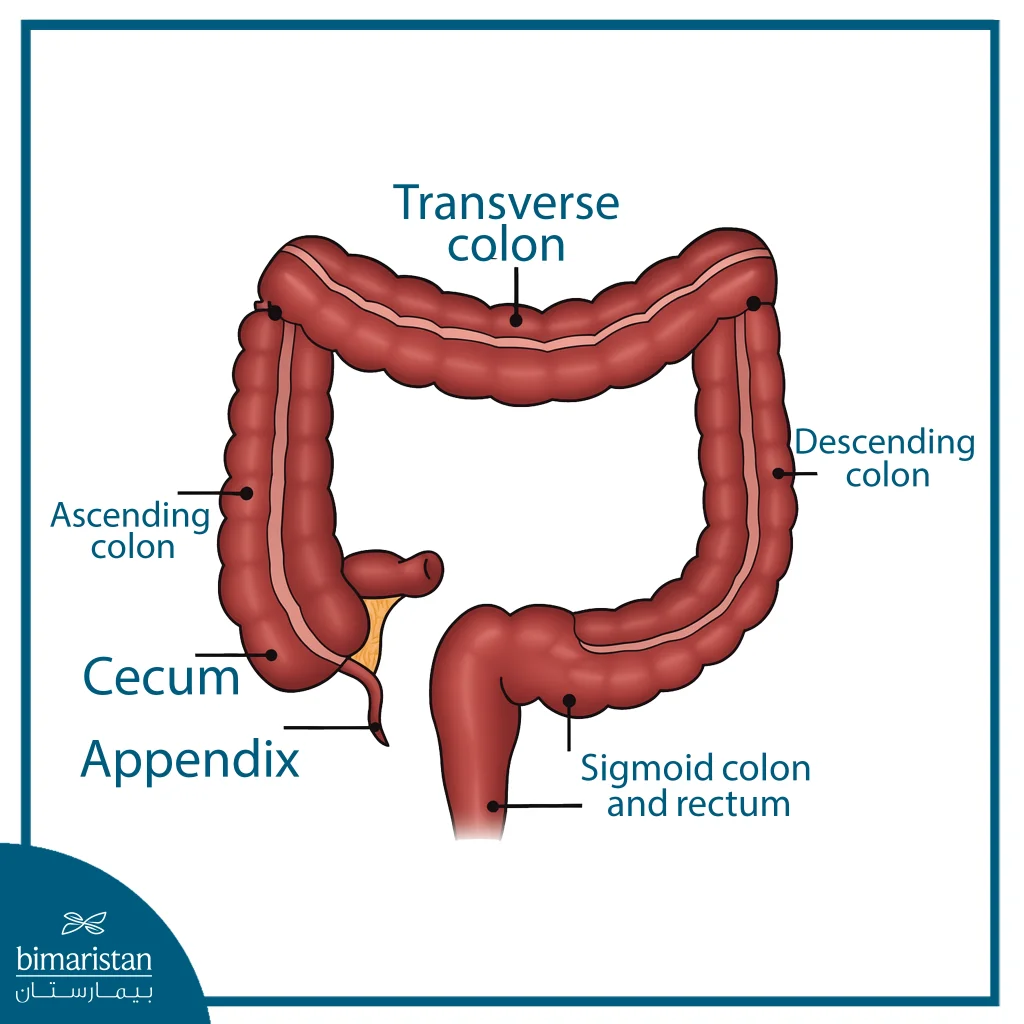
What is ulcerative colitis?
Ulcerative colitis is a chronic inflammatory disease of the large intestine (colon and rectum), characterized by persistent inflammation, irritation, and ulceration of the lining of the colon. What distinguishes it from Crohn’s disease is that it is limited to the large intestine, while Crohn’s disease can affect any part of the gastrointestinal tract from the mouth to the anus.
Ulcerative colitis is a chronic disease that accompanies the patient throughout his life, causing symptoms that affect the quality of life and cause social or psychological issues for the patient if these symptoms are not managed, and the disease may progress to give serious life-threatening complications that require urgent surgical intervention.
Causes of ulcerative colitis
Ulcerative colitis is one of the most common inflammatory bowel diseases, but the exact cause is still unknown. However, studies suggest that the disease is caused by a complex interaction between genetics, environment, the immune system, and certain medications or stressors. Here are the most common potential triggers of ulcerative colitis:
- Heredity hypothesis: Genetic factors are among the main causes, as having a family history of the disease increases the risk by about 10-25%. This hypothesis attributes the cause of ulcerative colitis to a genetic defect in the functioning of immune cells, where immune cells attack germs that normally live in the colon, causing recurrent inflammation and ulcers. In fact.
- Environmental factors: Some studies have linked environmental factors to a higher risk of developing ulcerative colitis. The likelihood of developing ulcerative colitis is higher in urban populations than in rural populations, possibly due to urban air pollution and a diet high in fat and toxins.
- Nonsteroidal anti-inflammatory drugs (NSAIDS): Some studies have found that one-third of patients with ulcerative colitis have worsening symptoms when using these medications.
- Psychological factors: According to a 2015 study, 82% of ulcerative colitis patients suffer from psychological issues, and these issues are often diagnosed before ulcerative colitis is diagnosed.
- Smoking: Some studies have found that smokers are less likely to develop the disease (this does not mean that the patient should be advised to smoke for prevention, as smoking is associated with a myriad of other medical issues).
Symptoms of ulcerative colitis
The symptoms of ulcerative colitis vary from person to person, depending on the severity of the disease and the location of the inflammation in the colon. Symptoms usually start gradually and may worsen over time if not treated appropriately.
The most important initial symptoms:
- Bloody bowel movements (blood in the stool)
- Frequent diarrhea
- Lower abdominal pain
- nausea and fatigue
- anemia
- Over time, weight loss may occur
Symptoms may worsen over time, and the following symptoms may occur:
- Mucus or pus in the stool
- Fever and rash
- Joint pain
- Uveitis
- Severe abdominal pain
- Electrolyte disorder
Diagnosis of ulcerative colitis in Turkey
Colonoscopy is the most accurate way to diagnose ulcerative colitis and is widely used in Turkey thanks to the availability of specialized medical centers and highly experienced gastroenterologists.
Colonoscopy
If a doctor suspects ulcerative colitis, he or she may perform a colonoscopy, where a soft, flexible tube connected to a camera is inserted down the rectum and through a screen, the colon mucosa is viewed for ulceration or inflammation at the level of the colon mucosa. A biopsy of the colon can be taken by colonoscopy to be examined in the laboratory under a microscope and to check for the presence of pathological changes, as several biopsies must be taken to investigate and confirm the infection.
Periodic endoscopies are recommended to monitor disease progression, especially since ulcerative colitis increases the risk of colorectal cancer.
Blood tests
Your doctor will usually order blood tests to look for anemia or signs of inflammation, such as elevated markers, and blood tests can help determine whether or not you have an infection.
Fecal transplant
A stool culture is used to rule out other possible causes, such as infection with bacteria or parasites, as microorganisms may be present in the stool, and the presence of occult blood in the stool and leukocytes is also investigated.
Other radiographs
To rule out other causes, such as Crohn’s disease, the doctor may order other radiographs, such as an MRI or CT scan, to look for inflammation elsewhere in the body.
How to treat ulcerative colitis in Turkey
There are several treatment options, depending on the severity of the condition and the patient’s response and desire, so ulcerative colitis treatment methods range from medications to surgery.
Ulcerative colitis treatment using drugs
In cases with mild symptoms, ulcerative colitis treatment can be done using anti-inflammatory drugs in the large intestine:
- Aminosalicylates: The most popular drugs used in this group are sulfasalazine and mesalamine, where mesalamine is given in the form of a rectal suppository. The suppository has a good effect on the rectum, but its impact on the colon may be weak, so suppositories and oral medications are used in combination.
- Steroids: If there is no response to the previous treatment or in cases with more severe symptoms, steroids that inhibit inflammatory reactions are used; the most commonly used steroids are prednisone.
- Biological therapy: In severely symptomatic cases of ulcerative colitis that do not respond to previous treatments, proven biologic medications such as infliximab are administered, which inhibit the tumor suppressor TNF and thus weaken the inflammatory response in the body as a whole.
Surgical ulcerative colitis treatment
When do we need surgery for ulcerative colitis?
About 30% of ulcerative colitis patients require surgical ulcerative colitis treatment at some point in the disease, especially in cases that do not respond to drug therapy, or when serious complications arise, such as heavy bleeding, toxic colonic dilation, or precancerous changes.
Preparing for surgical ulcerative colitis treatment
Before undergoing ulcerative colitis treatment, the doctor will ask the patient to stop taking certain medications that may increase the risk of bleeding and complications, such as blood thinners.
The patient is also asked to fast for a period ranging from several hours to a full day as instructed by the medical team, and the doctor usually prescribes antibiotics to prevent infections associated with the procedure.
In addition, the intestines are cleaned before surgery using a cleaning solution or laxatives to ensure that the colon is free of waste and minimize the risk of infection.
Colorectal resection with ileal J-pouch procedure
Colorectal resection with the creation of an ileal pouch (J-pouch) is the most common procedure for chronic ulcerative colitis treatment. The resection is done in two operations, where the entire colon and rectum are removed, then a J-shaped pocket of small intestine is formed and connected to the anal canal, allowing the patient to defecate normally without the need for an external pouch.
First operation
First, the colon and rectum are removed, and then the doctor creates a J-shaped bag through the small intestine. The bag connects the end of the small intestine to the anal canal to allow the ability to expel waste from the rectum. A temporary ileostomy is created to allow waste to pass through the abdominal wall, where a temporary external bag is placed for a period of time to collect the waste. The goal of the ileostomy is to allow the pouch to take its place while the external pouch is removed and the new pouch takes over the function and role of the removed colon.
Second operation
About 8 to 12 weeks after the first operation, the inner pouch (J pouch) is ready to perform its function, so the ileostomy is closed and the external pouch is removed, and the patient is able to excrete waste through the new pouch that connects the small intestine to the anus.
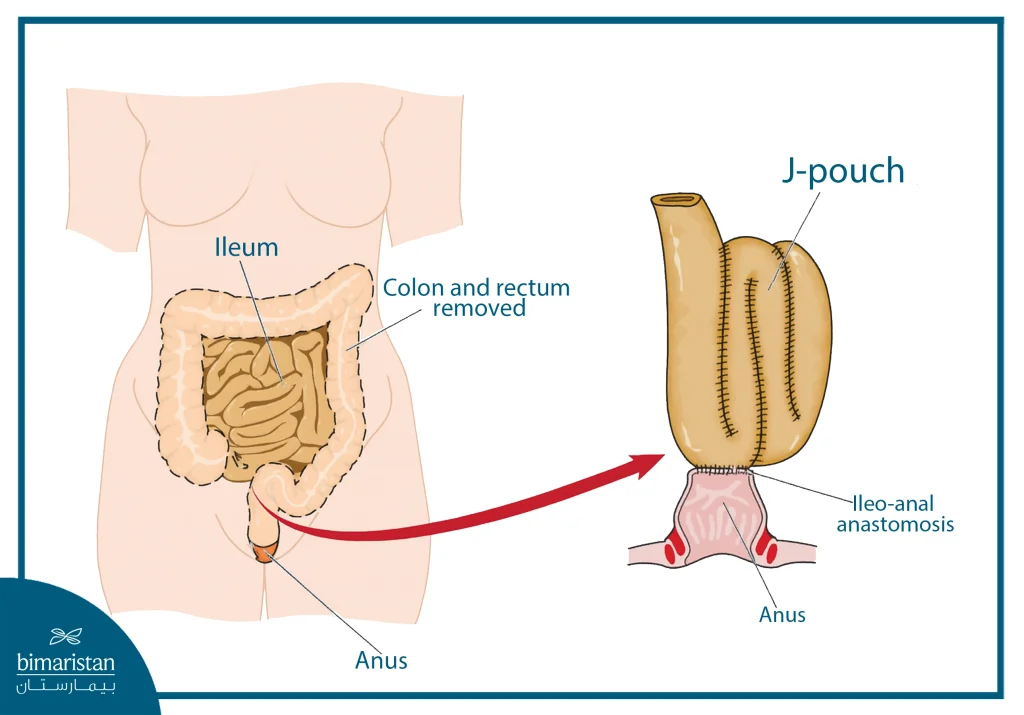
Is the Wafi procedure a permanent alternative to a gastrostomy?
The Wafi procedure is a modern surgical technique developed as a temporary alternative to the traditional ileostomy, which aims to protect the surgical junction after rectal or colonic resection without the need for a permanent ostomy on the abdominal wall. In this procedure, a thin tube is inserted into the ileum to temporarily drain feces, and the lower part of the intestine is ligated in a way that allows partial diversion of bowel movement until the junction is fully healed, and then the tube is easily removed without a second surgery.
Unlike a permanent ostomy, the Wafi procedure does not form a permanent external opening, but is a temporary solution to minimize leaks and complications after surgery, meaning the patient does not need an ostomy bag for the rest of their life.
Compared to J-pouch (rectal reconstruction), the difference is significant:
- Wafi is a temporary shunt procedure used to protect the surgical junction after a colon or rectal resection.
- A J-pouch is a procedure used to restore excretory function after a complete colectomy.
The Wafi procedure is not a replacement for a lifetime gastrostomy, but rather a temporary and safe alternative to a traditional prophylactic ostomy, aimed at minimizing complications and accelerating recovery without the need for a permanent opening on the abdomen.
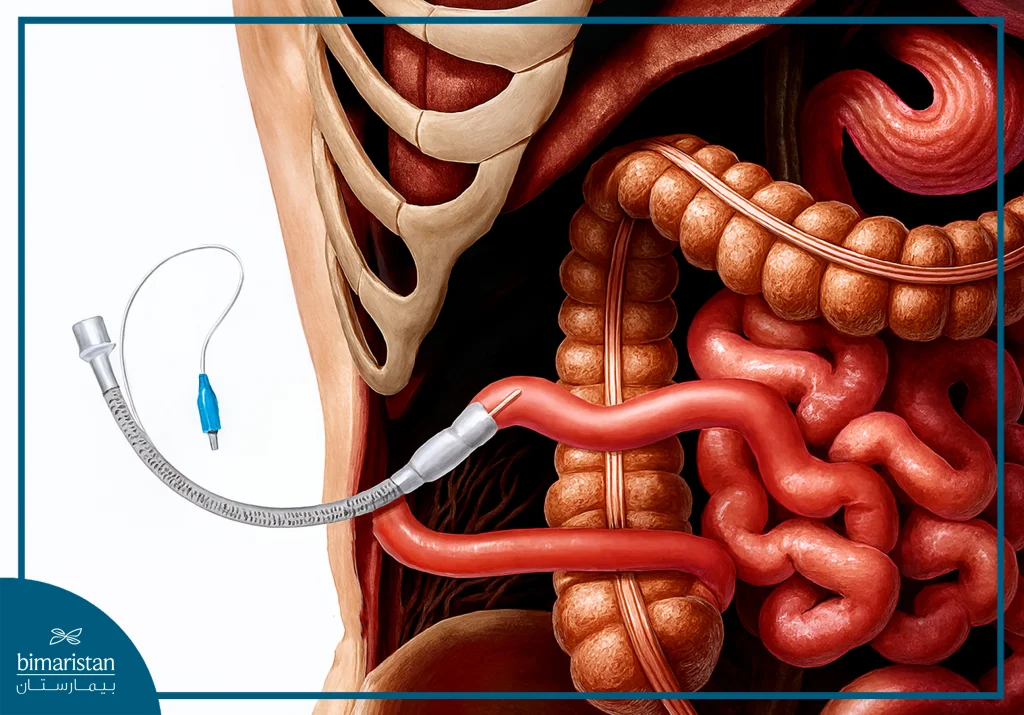
Colorectal and anorectal resection with final anastomosis for Faifi
In this operation, the colon, rectum, and anus are removed, after which a permanent ileostomy is made and an external bag is installed to expel waste. In this type of surgery, an external bag is worn for the rest of the patient’s life, and the bag is changed from time to time according to the doctor’s instructions, of course this type of surgery is more difficult for the patient than the first surgery that does not require an external bag.
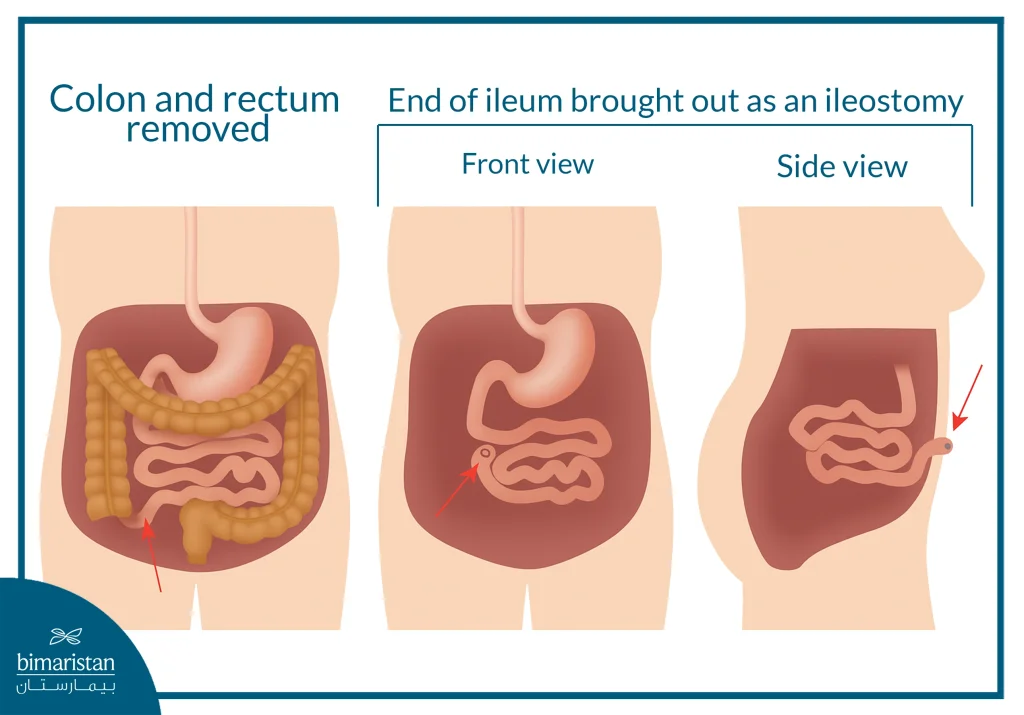
Follow-up care after surgical ulcerative colitis treatment
After surgical treatment of ulcerative colitis and installation of the j pouch, the patient remains in the hospital from 3 to 7 days for observation by the doctor, and the average recovery period is estimated from 4 to 6 weeks. After surgery, the patient is placed on a diet that includes soft foods; foods that cause gas should be avoided, and the patient is advised to drink plenty of water.
The body needs a period of time to get used to the changes that occur, as the new J-pouch does not give the same function as the removed colon and needs time to take the appropriate shape and size. Leakage may occur through the new pouch, prompting the person to defecate frequently, up to 12 times a day for several weeks, and the stools are soft and watery.
Over time, the new pouch increases in size and the anal sphincter becomes stronger, resulting in hard stools and fewer bowel movements per day. The number of defecations reaches about 8 times a day several months after the operation, and varies from person to person, and the stool consistency is closer to watery.
What is the cost of ulcerative colitis treatment?
The cost of ulcerative colitis treatment by colorectal resection with ileal J-pouch placement varies depending on experience, hospital type, and ancillary services, and typically ranges from $5,000 to $10,000.
Finally, ulcerative colitis treatment plays a vital role in preserving digestive health and enhancing quality of life. In Turkey, Bimarestan Medical Center provides comprehensive and specialized care for this condition, supported by an expert medical team and advanced technologies that deliver optimal outcomes for patients.
Sources
- U.S. Food and Drug Administration. (2022, April). Ulcerative colitis: Developing drugs for treatment (Guidance for Industry). U.S. Department of Health and Human Services
- Johns Hopkins Medicine. (2024). Ulcerative colitis treatment
- National Health Service. (n.d.). Ulcerative colitis – Treatment. NHS

